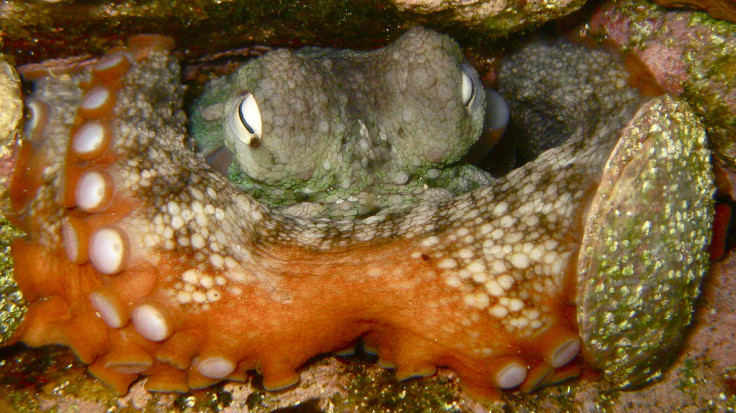Gloomy octopuses seen throwing stuff at each other

Gloomy octopuses in Australia have been seen throwing stuff at one another using siphons in their body normally used for jet propulsion. This behaviour seen in Octopus tetricus – more commonly known as the Gloomy octopus – living in Jervis Bay in Australia could be the first example of projectile weapons being used by the creatures.
Peter Godfrey-Smith, a marine biologist from City University of New York, announced his findings at the Behaviour2015 conference in Cairns. A report by New Scientist notes that it is unclear if the behaviour is an aggressive warning to other octopuses, or if they are just getting hit by accident during routine housekeeping.
Octopuses have siphons on the sides of their bodies that expel water forcefully, pushing them forward. However, the Jervis Bay Gloomy octopuses appear to have adapted this system for the purpose of throwing.
"Very few animals have been reported to throw things at one another, so it would be significant if the octopuses are doing it," Godfrey-Smith said. "In the 'throwing' behaviour, it gathers up a pile of stuff in its arms, and then directs the jet under the web of its arms, and throws out all the stuff under pressure. So it's a throw rather than a spit, though the throw uses water pressure – it uses a sort of inverted jet propulsion."
The Gloomy octopuses live in dens with each occupying a small area of approximately one metre squared – their neighbours can be just 30cm from them, which is not ideal for the solitary species. However, the abundance of food there means they stay living in these less-than-ideal conditions.
They normally feed at night using their sharp beaks to feast on crabs and molluscs, but have also been known to eat their own species. Each creature is highly territorial and sits in its lair during the day surrounded by rocks and rubble it collects to defend its home.
While octopuses regularly clean out their homes, researchers note that other octopuses got hit more often than would be expected just by chance. If it is intentional, it is though this behaviour is the result of the crowded conditions they live in.
© Copyright IBTimes 2024. All rights reserved.







